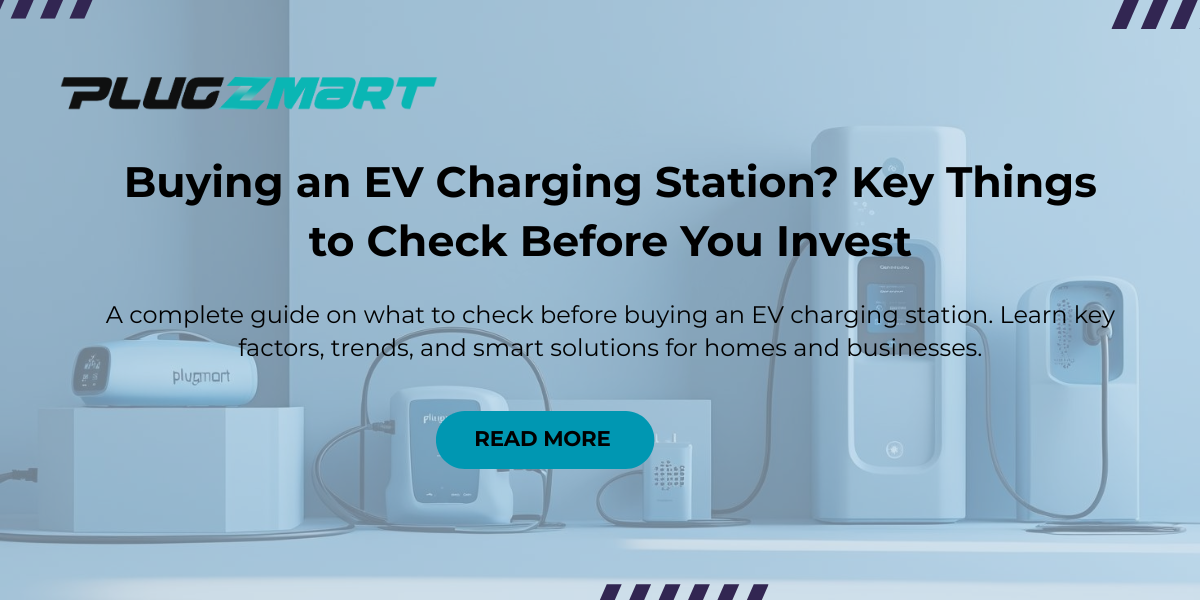As electric vehicle adoption accelerates across India, more homeowners, businesses, and fleet operators are considering installing EV charging stations. Whether it’s for personal convenience, commercial revenue, or employee/workplace charging, the decision involves more than just selecting a charger. The right charging station can improve user experience, boost energy efficiency, and ensure long-term return on investment.
Before you buy, here are the most important things you should evaluate to make an informed choice.
1. Understand Your Charging Needs: Home, Commercial, or Fleet?
The first step is identifying where and how the charger will be used.
Home Charging
For residential use, a Level 2 AC charger (3.3 kW to 7.4 kW) is ideal. It offers overnight charging convenience and affordable installation. Make sure your home wiring can support the load or check if an upgrade is required.
Commercial Charging
Offices, shopping malls, restaurants, and parking lots typically choose multiple AC chargers or DC fast chargers (30 kW to 120 kW) to support quick turnaround times. Commercial charging also requires a robust CMS for billing, energy monitoring, and access control.
Fleet Charging
Fleet operators should look for load balancing, scheduling, RFID authentication, role-based access, and wallet management. A dedicated platform like the Plugzmart EV Charging Management System can drastically simplify operations.
2. Verify the Power Output & Charging Speed
EV chargers come in different power ratings, and choosing the right output directly affects charging time.
- 3.3 kW to 7.4 kW (AC) → Home charging, slow and safe
- 11 kW & 22 kW (AC) → Workplaces, apartments, and commercial spaces
- 30 kW to 120+ kW (DC fast chargers) → High-traffic zones, fleets, and public stations
A common mistake is overinvesting in high-power chargers without need. For example, a mall may benefit from 22 kW AC chargers instead of 120 kW DC chargers, as most users park for hours.
3. Look for OCPP Compliance and Smart Features
Smart charging is no longer optional. It ensures easy monitoring, remote access, analytics, and scalability.
Key features to look for:
- OCPP 1.6J or OCPP 2.0.1 compliance
- Real-time monitoring
- Load balancing
- Dynamic tariff control
- User authentication (QR/RFID)
- Energy usage reports
- Remote troubleshooting
Choosing a smart charger helps reduce downtime and keeps your charging station future-ready.
If you plan to offer the charging experience under your brand, look for a solution like Plugzmart White-label CMS to maintain full ownership over customer experience and data.
4. Evaluate Build Quality, Safety Standards & Weather Protection
A charging station is an electrical asset that must withstand harsh conditions, especially in India.
Check for:
- ARAI certification
- Over-voltage, short-circuit, and surge protection
- Anti-theft mechanisms
- IP54/IP65 weather rating
- Fire-resistant enclosures
- Sturdy connectors and cables
High-quality chargers reduce maintenance costs and ensure maximum uptime.
5. Assess Installation Requirements
EV charging station installation varies based on power load, wiring, earthing, energy meter type, and site layout.
Key things to check:
- Existing electrical capacity
- Distance from panel to installation point
- Trenching or cable routing requirements
- Charger mounting (wall-mounted or pedestal)
- Civil work needs
- Load upgrades (if any)
A site survey by a certified installer is highly recommended. It avoids hidden expenses and ensures compliance with safety regulations.
6. Consider Software Integration and Scalability
If you’re planning to expand later—adding more chargers, connecting to rooftop solar, or managing fleets—your system should scale effortlessly.
Look for:
- Compatibility with multiple charger brands
- Multi-network support
- Automated billing and settlement
- Energy optimization
- Support for adding new chargers without major upgrades
Platforms like Plugzmart already support multiple charger types, including AC and DC, ensuring long-term flexibility.
7. Compare Total Cost of Ownership (Not Just the Charger Price)
Many buyers focus only on hardware cost, but the true cost includes:
- Installation
- Electrical upgrades
- Networking
- CMS subscription
- Maintenance
- Electricity tariff
- Future expansion
A dependable provider should offer transparent pricing and lifetime support. This helps ensure that your ROI remains intact over years of operation.
8. Choose a Trusted and Experienced EV Charger Provider
Selecting the right brand is crucial for reliability. Look for companies with:
- Proven installations
- Scalable product range (AC + DC)
- 24/7 customer support
- Strong CMS platform
- Customizable solutions
- Good warranty coverage
Brands like Plugzmart EV Chargers are engineered for Indian grid conditions and offer a complete ecosystem—from hardware to software—to make EV charging effortless.
Conclusion: Invest Smart, Charge Smarter
Buying an EV charging station is a long-term investment. With the right hardware, strong software backend, smart features, and a reliable provider, you can ensure high performance, user satisfaction, and profitability.
Explore flexible, future-ready solutions from Plugzmart to make your EV charging journey seamless and efficient.
FAQs
1. How much does an EV charging station cost in India?
AC chargers typically range from ₹15,000 to ₹70,000, while DC fast chargers can cost ₹2 lakh to ₹12 lakh depending on power rating and features.
2. Do I need government approval to install an EV charger?
Home chargers don't require approval, but commercial installations must follow DISCOM and electrical safety guidelines.
3. How long does installation take?
Home setups take 2–3 hours. Commercial or fleet sites may take 2–10 days depending on cabling and load upgrades.





Comments